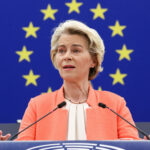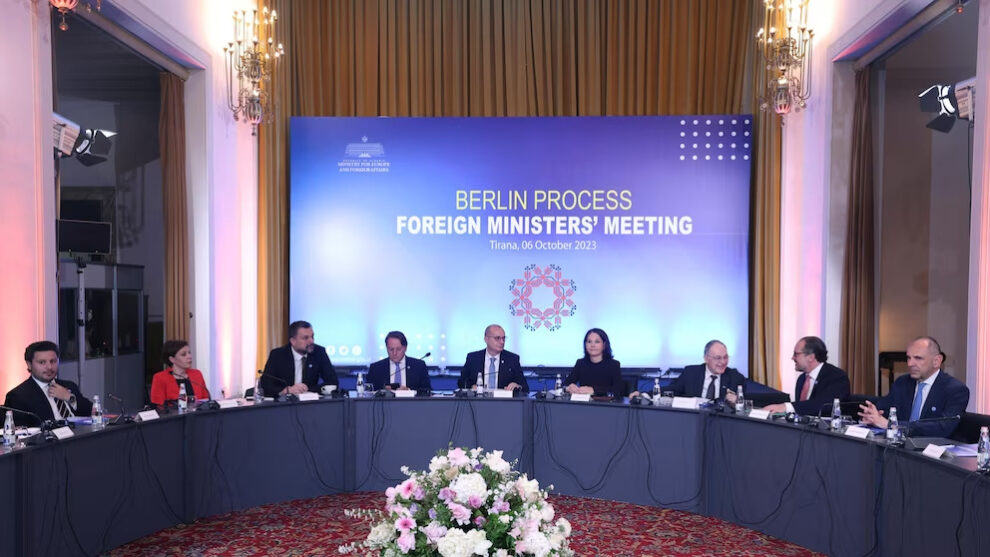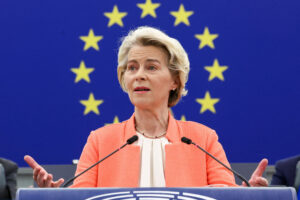Germany’s foreign minister has expressed the European Union’s deep concerns following the recent shootout between masked Serb gunmen and Kosovo police that left four people dead and sent tensions soaring in the region
TIRANA, Albania — Germany’s foreign minister on Friday expressed the European Union’s deep concerns following the recent shootout between masked Serb gunmen and Kosovo police that left four people dead and sent tensions soaring in the region.
Annalena Baerbock was in Tirana, Albania at a foreign ministers’ meeting ahead of the Oct. 16 summit on the Berlin Process, an initiative from Germany and France to encourage six Western Balkans countries to keep working toward membership in the bloc.
The top diplomats of the six countries — Albania, Bosnia, Kosovo, Montenegro, North Macedonia and Serbia — are meeting with Baerbock, EU Enlargement Commissioner Oliver Varhelyi and other senior EU officials.
“The foundation for mobility in the region is security and safety,” Baerbock said ahead of the meeting, adding that “tensions within the last days between Serbia and Kosovo are also endangering this Berlin Process.”
“The key to resolving the conflict is in Belgrade and Pristina, though some may not be pleased to listen to that,” she said.
On Sept. 24, around 30 heavily armed Serb men first killed a Kosovar police officer and then set up barricades in northern Kosovo before launching an hours-long gunbattle with Kosovo police.
Kosovo has accused Serbia of orchestrating the “act of aggression” against its former province, whose 2008 declaration of independence Belgrade doesn’t recognize. Serbia has denied this, saying that the gunmen acted on their own.
Meanwhile in Kosovo, Maj. Gen. Angelo Michele Ristuccia, the commander of the NATO-led peacekeeping force, called on both Kosovo and Serbia on Friday to return to the negotiating table to resolve their issues to prevent further violence. He urged both countries to “refrain from inflammatory and counterproductive rhetoric and help to create the necessary conditions for lasting security.”
The six Western Balkan countries are at different stages of integration into the bloc. In 2013, Croatia, also a Western Balkans country, became the EU’s newest member. Since then, progress has stalled and there is no clear timeline for membership.
Albanian Foreign Minister Igli Hasani said the October summit in Tirana will focus on proposals that will “significantly improve the region’s economic development” with projects in transport, electronic development, telecommunication and raw materials.
“It aims at the revitalization of the European integration process,” he told a news conference, and to better prepare countries for EU membership.
Baerbock said the Berlin process is crucial” in promoting connectivity and cooperation in the region. She added that a key conference in Berlin in November on EU enlargement will try to “keep the promises given a long time ago.”
The EU has not deemed the remaining Western Balkan countries’ economies and political institutions ready for integration into the EU’s single market of borderless trade and Western democratic ideals.
Varhelyi of the European Commission said some 15 billion euros ($15.8 billion) are to be invested in 54 major projects in the region. A new EU investment plan will try to “speed up” economic programs and “help the region change” even before EU membership.
The war in Ukraine has put integration of the Western Balkans high on the agenda as the EU works to reinvigorate its enlargement process. Ukraine is also seeking to join the bloc, along with Moldova and Georgia.
Source : ABC NEWS















